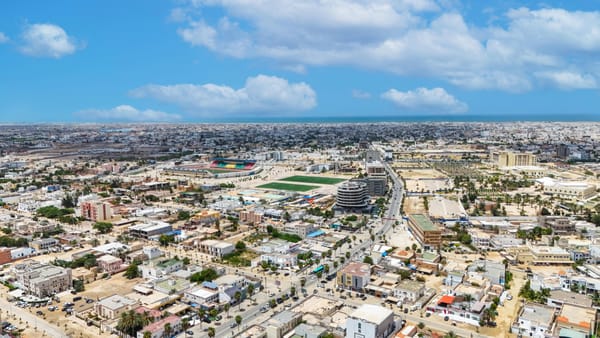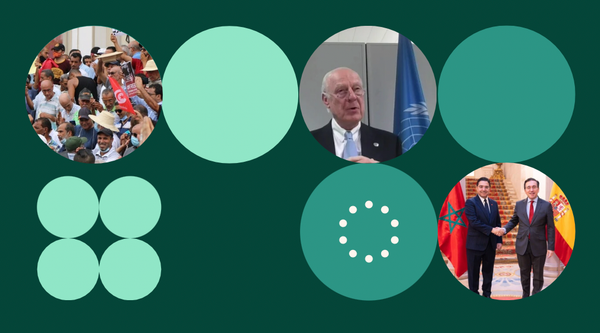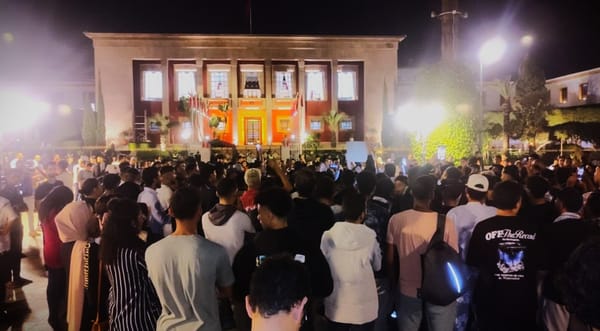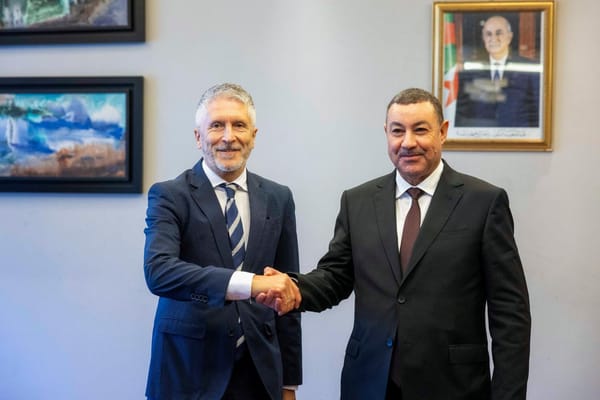A New Trade Agreement with Morocco? The European Commission Invokes the 'Tacit Consent' of the Sahrawi People
REPORT. The expiration of the extension granted by the CJEU forces the EU executive to resort to an innovative legal formula rife with challenges in order to validate a key agricultural agreement for both parties.

- The agreement on the liberalisation of agricultural and fishery products expires on 4 October. The agreement was annulled by the CJEU last year due to its alleged extension to the territory of Western Sahara without the consent of its people. Without an agreement, Moroccan products (and those from Western Sahara under Moroccan control) would no longer benefit from the current tariff preferences.
- The European Commission is seeking to invoke the principle of tacit consent, which would enable it to sign the agreement with Morocco alone, provided that a 'precise, concrete, substantial and verifiable benefit' for the Sahrawi people is recognised. However, the leaked text contains several undefined points that call into question whether this requirement is being met, and therefore its compatibility with the CJEU ruling and international law.
- Even if the new agreement enters into force provisionally, there is uncertainty over its eventual validation by the European Parliament, which would expose all parties to serious legal uncertainty.
In a few days, the one-year extension granted by the Court of Justice of the European Union (CJEU) to the Commission to renegotiate the agreement on the liberalisation of agricultural and fishery products signed by the EU and Morocco in 2018 will expire. This agreement was annulled by a CJEU ruling on 4 October 2024. The EU's highest court upheld the General Court's opinion that the agreement (along with the agreement on fishing licences) should be invalidated, as it sought to extend to the territory of Western Sahara without the required consent of the 'people of Western Sahara'.
The Council and the European Commission are now faced with a complex situation. Although the court has paved the way for a new agreement that respects international law without the involvement of the Polisario Front, its implementation will be challenging in the current international context, which differs greatly from that of 2018.
The rulings
Although the one-year period coming to an end refers to the validity of the liberalisation agreement, which offers tariff preferences for certain Moroccan agricultural and fishery products, three rulings were handed down on 4 October 2024 concerning agreements under the Euro-Mediterranean Agreement of 1996. In addition to annulling the liberalisation agreement, a second ruling also confirmed the annulment of the fisheries agreement, which authorised EU fishermen to fish in Moroccan waters, including those off the coast of Western Sahara. A third decision resolved a preliminary ruling requested by the French Council of State and declared that agricultural products from Western Sahara, specifically melons and tomatoes, must be labelled clearly showing 'Western Sahara' as their country of origin.

Read our analysis of the first instance rulings
The first two judgments followed the same line of reasoning as the General Court in its 2021 rulings. According to the principle of the relative effect of treaties, the intended extension of the agreements to the territory and waters adjacent to Western Sahara required the consent of the 'people of Western Sahara'. This consent had not been obtained by either the EU or Morocco.
The CJEU also considered that the efforts made by the European Commission to obtain such consent were insufficient, as had previously been determined by the General Court. This is because such consent cannot be inferred from merely consulting the current populations of Moroccan-controlled Western Sahara, even if they largely approve of the agreements and declare them to be beneficial. The court thus highlighted once again the difference between the concept of the 'population' of the non-self-governing territory under Moroccan control and the 'people' of that territory, who are entitled to self-determination. To determine this, the court relied on estimates provided by the parties to the proceedings, which suggested that up to 75% of the Sahrawi people are in the Tindouf refugee camps in Algeria, compared to 25% who remain in the territory of the former colony.
However, despite recognising that express consent was not obtained, the CJEU provides European institutions with a legal 'way out' to enable them to reach a new agreement in accordance with international law. Unlike the General Court, the High Court affirms that it would be possible to base the agreement on tacit consent, provided that, in addition to not creating obligations for the Sahrawi people, the agreement recognises a 'precise, concrete, substantial and verifiable benefit' for that people, which is proportional to the planned exploitation of resources and accompanied by sustainability guarantees. Furthermore, an agreement on these terms would require a regular monitoring mechanism to verify this benefit. This mechanism could be subject to prior approval by the Court of Justice itself.
Furthermore, the court 'shields' this tacit consent, since, once established, it cannot be challenged by the legitimate representative of the Sahrawi people unless they can prove that such a benefit does not exist or that the control mechanism is ineffective — that is, by means of lengthy legal proceedings.
The court also states that this benefit does not have to benefit only the people of Western Sahara, and that the fact it also favours the current populations of the territory is not grounds for challenging the consent.
Thus, the EU judge paves the way for negotiating a new agreement without the need to obtain the express consent of the Polisario Front, saving what has always been a real red line for Morocco. While recognising the armed movement's standing to sue and its status as a 'privileged interlocutor' in the self-determination process, the court recalls once again that no international jurisdiction has considered the Polisario to be the exclusive representative of the Sahrawi people.
International reactions
The rulings were met with visible discomfort, and even rejection, by the European Union's foreign ministries. Rather than accepting the rulings' conclusions, the various communiqués prioritised not upsetting Rabat, emphasising the need to preserve and protect relations with Morocco. They almost unanimously described Morocco as a 'strategic' interlocutor and partner.
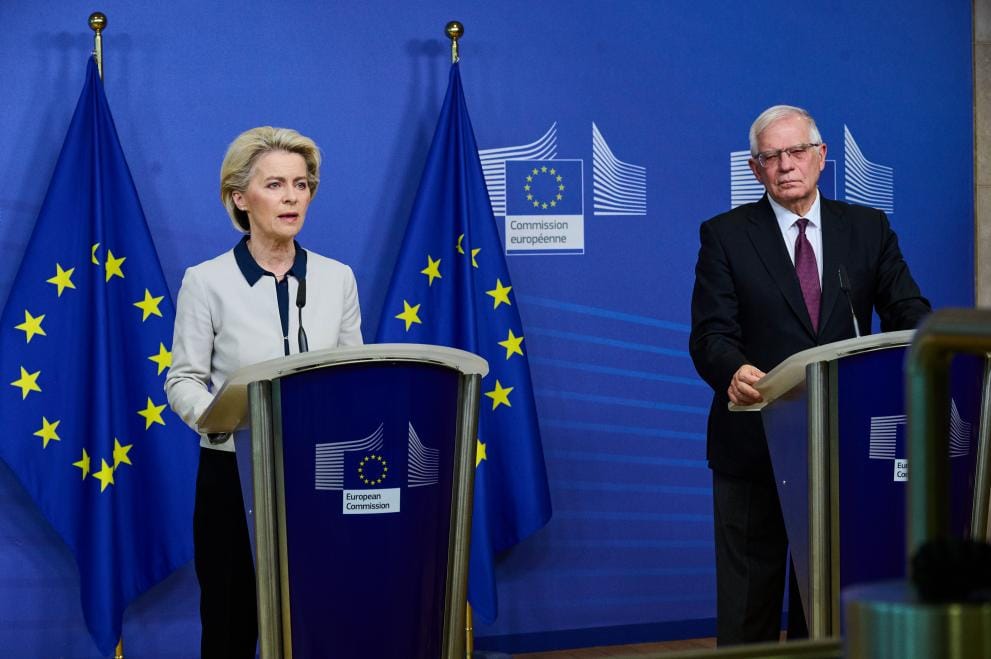
Almost immediately, the Commission, its President Ursula von der Leyen, and High Representative Josep Borrell issued a joint statement reaffirming the EU's commitment 'to preserving and further strengthening close relations with Morocco in all areas' and reiterating the importance of its 'strategic partnership'. The statement called for an analysis of the rulings' content, while reaffirming the intention to take the 'deep friendship and solid, multifaceted cooperation' with Morocco 'to a higher level in the coming weeks and months'.
Furthermore, some capitals implied that the CJEU had overstepped its powers by ruling on a matter belonging to the EU's foreign policy, which falls inside the European Council's exclusive competence.
On the same day, Morocco stated that it was not concerned by the rulings, as it had not participated in the proceedings. However, it accused the court of not only legal and factual errors, but also of ‘total ignorance of the case's realities’ and ‘blatant political bias’. It demanded that the European institutions and Member States respect the commitments made to provide the necessary ‘legal certainty’ to a ‘strategic’ partner. Days later, in the presence of Canary Islands President Fernando Clavijo, Foreign Minister Nasser Bourita warned the EU that Morocco would not sign any agreement that did not respect its national unity and territorial integrity. He described these as 'clear and non-negotiable' red lines, and affirmed that it was solely up to the Europeans to find solutions to the situation created by the rulings.
In his annual speech commemorating the Green March, King Mohammed VI also issued a warning that seemed to be directed at the CJEU, reproaching 'another world, separated from the truth, which still lives on illusions of the past, clinging to theories that have long been overtaken by time', and reaffirming that Morocco will not enter into any international agreement 'at the expense of its territorial integrity and national sovereignty'.
The rulings in Spain
In Spain, the Foreign Ministry's statement was almost identical to that of the Commission. Days later, the Minister of Agriculture and Fisheries, Luis Planas (formerly ambassador to Rabat), clarified the Spanish government's intention to reach a new agreement at all costs. He stated that 'the relations, union and joint work that we share with the European Union and Morocco are above what this ruling has raised'.
Spain has played a notable role in this process, both by supporting the Commission and the Council in defending the validity of the agreements and by participating in the request for rectification of errors relating to one of the rulings, specifically that relating to the percentage of Sahrawis residing in territory controlled by Morocco. However, the court rejected this request without modifying the controversial point.
However, not everyone in Spain is keen to maintain trade agreements with Morocco. Indeed, the Popular Party (right) is trying to support farmers and will urge the European People's Party (of which President von der Leyen is a member) to convince the Commission to use this opportunity to ensure reciprocity, set quotas, and exclude products from Western Sahara during the renegotiation. This, coupled with the recent invitation extended to the Polisario delegate in Spain to attend the party's national congress, has heightened suspicions in Morocco about the stance that a potential Popular Party government might take in future. Other parties also oppose the extension of the current agreements: Sumar (far-left) is urging the inclusion of the Polisario Front in any renegotiation of the agreements — it submitted a parliamentary question to this effect on 11 September — while Vox (far-right) has already rejected the twelve-month extension and is calling for the agricultural product agreements with Morocco to be terminated outright.

As for sectoral organisations, there is a logical division of opinion. Fishermen's CEPESCA lamented the cancellation of the fisheries agreement, despite it having expired in mid-2023, which left 128 Union vessels without licences. Of these, 92 were Spanish. However, it was acknowledged that, under the previous protocol, only around twenty licences per vessel were used. Upon the agreement's expiry, these licences moved to the Gulf of Cádiz or Mauritania. On the other hand, the Confederation of Farmers (COAG) has been denouncing importers of products from Western Sahara for failing to comply with the agreements. COAG has also complained about unfair competition and consumer deception, as well as the lack of transparency on the part of the authorities regarding the future implementation of the rulings.
Next steps
On 22 July, the European Commission submitted a proposal to the Council to start negotiations to revise the liberalisation agreement, in order to align it with the 4 October ruling. This would maintain trade relations and allow imports of products from Western Sahara to continue at the same preferential tariff rates as those applied to Morocco. The Danish government, which holds the rotating presidency, supported the Commission's proposal without publishing its content.
In fact, the process of drafting the new agreement has been carried out with the utmost discretion, with no details about the specific implementation modalities of the rulings being publicly revealed. On 22 September, Trade Commissioner Maroš Šefčovič remained tight-lipped about the Commission's proposal in his written response to a parliamentary question from May, stating only that he was ‘in talks with the Moroccan authorities to find a solution following the ruling’.
However, on 29 September, the NGO Western Sahara Resource Watch leaked the proposed decision, which will reportedly be voted on by the Council of Europe (via COREPER) today (1 October) under urgent procedures. If authentic, the document would contradict Commissioner Šefčovič's statement. According to the explanatory memorandum, the Council authorised the Commission to enter into negotiations with Morocco on 10 September. These negotiations took place between 10 and 15 September, when representatives of both countries initialed a final agreement.
The proposed decision would effectively opt for tacit consent, providing for two actions to comply with the requirement of a 'precise, concrete, substantial and verifiable benefit' imposed by the 4 October ruling. On the one hand, it would involve financing initiatives in key sectors such as water, including irrigation, energy, combating desertification and water desalination, in line with the principle of sustainable development, in regions under Moroccan control. On the other hand, it would involve increasing humanitarian aid to the Tindouf camps, channelled through EU and UN mechanisms, as well as promoting education, culture and skills programmes in those locations. The draft would also stipulate that these benefits would be subject to a 'monitoring mechanism', though no details are offered in this regard.
The draft also addresses labelling, establishing that products from Western Sahara would be clearly marked with the 'region of origin' to distinguish them 'from products in the same sector originating in Morocco', though it does not specify whether 'Morocco' would be indicated as the country of origin in both cases.
Is tacit consent a viable option?
If the draft is verified as authentic, it seems that the Commission will promote signing a new agreement based on tacit consent. This would be a way for the Commission to "save face" by recognising a benefit for the Sahrawi people, while following the path opened up by the CJEU. This would allow the EU to continue applying tariff preferences to products from Western Sahara exported by Morocco, seemingly in compliance with international law. However, even if it proceeds in this way, the Commission would still face significant obstacles no less complex than those it encountered when concluding the previous agreement, which could subsequently lead to the annulment of the new one.
1) Firstly, there is still no certainty about the percentage of Sahrawis living in the territory and in the Tindouf camps. The calculation of the possible benefit to be granted to the people of Western Sahara should be based on more accurate figures than those currently used, which are mere estimates subject to partisan interests. The 4 October ruling appears to consider that only a quarter of Sahrawis currently reside in the non-self-governing territory, with the remaining 75% living in Algeria as refugees. However, the court itself acknowledges that it is relying on estimates provided by the Polisario Front, who have refused to allow an accurate census to be carried out in the camps for over thirty years. According to the movement, around 250,000 Sahrawis reside in Tindouf, with approximately 125,000 residing in the territory of the former colony. In the absence of a neutral, verified population register, however, other figures are often based on calculations made by international organisations for the distribution of subsistence resources. For example, the World Food Programme distributed 133,000 food rations each month to 'vulnerable people' in the Tindouf camps in collaboration with the EU in 2024 and 2025. Given the obvious internal debate about the appropriateness of the agreement, EU institutions must consider that European citizens may demand more reliable data before a new pact is signed as this is, of course, likely to affect the Union's coffers and the already agitated European 'camp'.

2) It is unclear whether the anticipated benefit is 'precise, concrete, substantial and verifiable', or whether it will benefit the people of Western Sahara. As no specific figures are provided, increasing humanitarian aid to the Tindouf camps or promoting training programmes for refugees cannot be considered precise, concrete or substantial benefits. Furthermore, the draft seems to overlook the fact that the judgment required this benefit to be 'proportionate to the importance of the exploitation of resources', a point that is not addressed in terms of potential quantification. Finally, while the text emphasises financing essential projects in the territory controlled by Morocco, it does not compare this financing with that of humanitarian aid to Tindouf. This may be interpreted as that the aim is once again to benefit the current 'populations' of the territory (not only Sahrawis) rather than the 'people of Western Sahara'.
These significant shortcomings in terms of precision and specificity could lead to the agreement being annulled again. Thus, based on the judgment, it appeared that the CJEU was considering an equitable distribution of the benefits of exploitation according to the location of the Sahrawi people. In other words, if it were determined that 25% of the population lived in the territory and 75% lived in the Tindouf camps, these percentages would be applied to the distribution of the 'benefit'. However, it is also true that the definition of such a distributable benefit was extremely complex in this case. Unsurprisingly, the liberalisation agreement recognises tariff preferences for the export of agricultural products (under quotas) to the EU that are lower than those applied to products from other territories, or non-existent in some cases. But how can a tariff that is not applied be distributed? Taking into account the lack of alternative agricultural products in the Polisario Front-controlled area, it seems that this complexity has led the Commission to increase humanitarian aid. However, it does not appear that the required criteria of precision, specificity and proportionality have been correctly applied – at least in the leaked draft. In any case, the Commission could have consulted the CJEU on the appropriateness of this benefit, as proposed by the judge in the ruling.
3) The benefit must accrue to the ‘people of Western Sahara’. In practical terms, this raises another question: who will receive the benefit? Until now, the EU's humanitarian aid for the refugee camps has effectively taken the form of monetary and non-monetary contributions to the activities of international agencies such as the World Food Programme, as well as NGOs operating in Algeria. If the same were to be done in this case, as set out in the leaked draft, would the requirement imposed by the judgment be met? Or is the CJEU considering another recipient? In any case, it seems unlikely that the EU would agree to make direct transfers to the Polisario Front, especially given Morocco's opposition to financing the independence militia, and in the absence of another state structure recognised by the Member States.
4) The other major issue that the Commission must address, should an agreement have been reached, is how Morocco has been convinced to recognise a benefit to the Sahrawi people in the Tindouf camps. The fact that this is a requirement imposed by EU jurisdiction does not seem sufficient for Rabat to have accepted it unconditionally. As previously mentioned, Morocco places great importance on the Western Sahara issue, so it is surprising that it has consented to any measure that could benefit the Polisario Front or call into question its sovereignty over the territory or the exploitation of its resources. This is particularly surprising given that the 50th anniversary of the Green March is approaching and legislative elections are scheduled for 2026; these events could further radicalise nationalist rhetoric in the coming months. From an economic point of view, Morocco certainly needs the agreement more than the EU, given that 60% of its agricultural exports go to the Union. However, in the medium term, Morocco could seek alternatives in other markets, such as the US, Russia, China and the United Kingdom, or even convert to industrial agriculture, which has a higher added value. The agreement appears to include significant economic incentives for the territory under Moroccan control, primarily for financing essential regional development projects. However, it cannot be ruled out that other political incentives have also been negotiated, such as pressure on the CJEU and decisive support in the UN. Nevertheless, the Commission is at risk of both the European Parliament and European civil society demanding greater transparency regarding the compensation negotiated for Morocco's signing of this new agreement.

5) In fact, the last hurdle facing the Commission is the internal debate. The Danish Presidency appears willing to push for a new agreement based on the terms dictated by the ruling. Traditionally, the Nordic states have been more sympathetic to Sahrawi demands. However, last year, the Danish Foreign Minister described the Moroccan proposal for autonomy for Western Sahara as 'a serious and credible contribution' and 'a good basis for a solution', without mentioning the right to self-determination or a referendum. France has already recognised Moroccan sovereignty over the territory, which seems incompatible with the right of the Sahrawi people to self-determination and obtaining their consent, even tacitly. Spain has not reached that point of recognition, but the current government does not seem willing to confront Morocco again, as it considers the Moroccan proposal for autonomy to be 'the most serious, realistic and credible basis'. However, although the agreement seems likely to be endorsed by the European Council as a matter of urgency to allow its provisional application, the European Parliament could still highlight the lack of transparency in the process and demand a thorough debate on the matter before final validation.
Conclusions
For years, trade agreements with Morocco have been among the cases in which the relationship between economics and politics has been most profound, as considerations of tariffs and product labelling are intertwined with issues of sovereignty, territorial claims, and international law. Morocco has made it very clear that it will not sign any agreement that contradicts its claims over what it considers to be its 'southern provinces'.
The 4 October 2024 ruling put the Commission on the ropes, but left it with a legal loophole to avoid the Polisario Front. Tacit consent would allow the Commission to sign a new agreement with Morocco, provided a precise, concrete, substantial and verifiable benefit for the Sahrawi people is recognised. However, it seems that the EU executive has made little effort to consider such a benefit in the new draft, leaving it vulnerable to opposition from the European Parliament and subsequent scrutiny by the CJEU. It seems that, under pressure of time, the Commission has prepared an incomplete and imprecise text, knowing it will be annulled again in a year or so, thereby avoiding abrupt interruption to trade in agricultural and fishery products.
It would be worthwhile pausing at this point to reflect on the extent to which the EU needs to sign this agreement with Morocco. As might be expected, there are many conflicting interests within the Union itself. Not only are there economic development considerations as a mechanism for keeping populations in the territory (thus preventing them from migrating north), but there are also aspects of security in the supply of products and price stability in times of poor harvests or out of season. But are there no viable alternatives that would allow these issues to be addressed while reaching a solution in line with the rulings? Or is the Union seeking to appease the issue by achieving a temporary 'band-aid' solution while a final resolution to the Western Sahara issue is reached in other international forums?
In any case, the truth is that the EU may once again find itself facing a legitimacy issue when explaining why it is signing a new agreement that may not meet the requirements set by European jurisdiction. It will have to do so because, although this issue is camouflaged among more pressing international problems, it is of considerable interest to EU citizens, who are increasingly concerned about transparency regarding the origin and production conditions of the products they consume, as well as fair competition and respect for international law.


